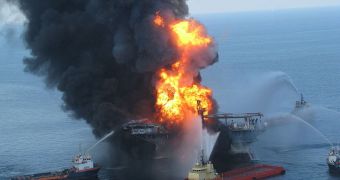Officials at British Petroleum announce that they have just awarded a research grant to experts studying the effects of the massive oil spill that took place in the Gulf of Mexico.
The disaster began unfolding on April 20, when the Deepwater Horizon semi-submersible drilling rig blew up, and then sunk. Oil began spilling in the Gulf without control, and millions of barrels of oil contaminated the region.
Now, BP – as the company which operated the drilling rig at the time of the disaster – has awarded $10 million in grant money to researchers at the Nova Southeastern University (NSU), who are now charge with analyzing the long-term impacts the oil spills will have on the ecosystem.
The announcement was made this week, and BP officials mentioned that the NSU team is only a part of a larger group of universities and research organizations in Florida, that have been selected to conduct such investigations.
The NSU part of the funding will go straight to the university's Oceanographic Center (OC). BP reps say that 27 research projects are currently underway in the Gulf
Each of the research initiatives is meant to assess one angle of the impact the oil spill had on marine life on the region, and also on the natural reserves dotting the coastlines the oil sheen affected.
“Given the magnitude and seriousness of the Deepwater Horizon spill, I'm very pleased that NSU researchers have had successful proposals funded by the BP block grant,” explains Richard E. Dodge, PhD.
He is the dean of the OC, as well as the executive director of the NSU National Coral Reef Institute. The study proposal forwarded by the Center was a part of the 233 the Florida Institute of Oceanography (FIO) consortium received.
Of all these proposals, only 27 were created. “We are making concerted efforts to better understand potential and actual impacts to our economically and biologically valuable marine ecosystems, such that we can be better prepared when spills reoccur,” Dodge explains.
The four main directions of research the OC will follow include conducting studies into how the oil spill affected marine life living in the Gulf area.
Another aspect will conducting periodic surveys of offshore fish communities, in an attempt to determine how the BP disaster affected feeding patterns and contamination levels
The third area of the study will focus on marine sponge and microbe communities, while the fourth will take a closer look at coral-sponge communities of the West Florida shelf.
“Actions taken to abate the April 20 oil spill, such as using chemical dispersants to breakdown the oil, may have effectively submerged or dispersed the oil into Gulf of Mexico waters,” says OC associate research professor Jose Lopez.
“Therefore, filter feeding sponges can possibly behave as good barometers to detect the oil's impact on marine environments over time,” adds the expert, who specializes in analyzing sponges and microbe communities.

 14 DAY TRIAL //
14 DAY TRIAL //